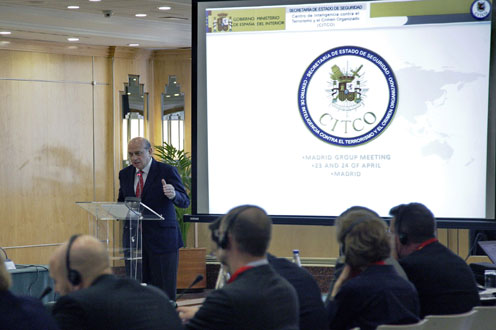Speaking to intelligence experts from 19 countries, Minister for Home Affairs highlights importance of international cooperation in combating global Jihadi terrorism threat
News - 2015.4.23
The Madrid Group meeting, organised by the Centre for Intelligence against Terrorism and Organised Crime (Spanish acronym: CITCO), is being attended by delegations from 19 countries. Representatives from such multi-national bodies as the European Police Office (EUROPOL), the International Criminal Police Organisation (INTERPOL), the Organisation for Security and Co-operation in Europe (OSCE) and the EU Intelligence Analysis Centre (INTCEN) are also present.
In his opening speech, the Spanish Minister for Home Affairs firstly highlighted "the role played by the centres and agencies dedicated to intelligence analysis and foresight, two essential disciplines for knowing and anticipating such threats as terrorism, as well as facilitating the decision-making process at political, strategic and operational levels".
Jorge Fernández Díaz then explained the fundamental reason behind creating the CITCO. "To coordinate national action against the two most serious factors threatening our security: terrorism and organised crime. These two threats, which are only separated by a fine line, are undergoing a gradual overlapping of their actions and manifestations, as demonstrated by the over 200 connections between terrorism and organised crime accredited by various investigations. This led us to combine the functions until then performed by two separate centres into a single agency", he said.
Optimistic message
After stressing that "today we can say that ETA is an episode from our past and no longer forms part of our future", the Minister for Home Affairs then focused on Jihadi terrorism, "which is based on a hatred of the West and the values of democracy and freedom inherent to our societies. The emergence of DAESH, its initial establishment in Syria and Iraq, and its influence and expansion into other territories in North Africa is a fact we should be concerned about. Furthermore, its media and propaganda apparatus - with a focus on the Internet and social media - translates into the activity by cells that, with increasing frequency, carry out attacks in our countries against our citizens and against our interests". To this situation he added the thousands of people - many of them from Europe - travelling to territories in open conflict (mainly Syria, Iraq and Mali) to join the ranks of Jihadi fighters.
Jorge Fernández Díaz, who recalled the Jihadi attacks committed on Spanish soil, sent a message "of optimism based on our experience, which has taught us that ending terrorism and radicalisation is indeed possible, while recognising that, it being a global threat, we need shared and agreed responses within the context of the closest possible international cooperation". He went on to add that "Spain is therefore, and wishes to remain, at the cutting edge of the fight against Jihadism, especially regarding its contribution in terms of analysis and foresight capabilities; for which it will offer its experience, structures and agencies, such as the CITCO, and its strongest political commitment".
Against this backdrop, the Minister for Home Affairs recalled that 122 international counter-terrorism operations took place in Spain from 2004, with a total of 566 arrests. "Thanks to the excellent work of the State law enforcement agencies, the number of arrests has increased; a total of 42 terrorists were arrested in the first four months of 2015. We also know that 115 Jihadi fighters travelled from Spain to conflict zones and that 14 have returned, of which nine are in prison and five have been released", he said.
Initiatives implemented in this legislature
Besides the operational activities carried out, in which the CITCO plays a fundamental role as coordinator, the Minister for Home Affairs highlighted the political and legislative measures developed over the course of this legislature. He mentioned the Anti-Jihadi Government Pact that led to a reform of the Criminal Code and the National Strategic Plan on Combating Violent Radicalisation. "These initiatives", he said, "are implemented by following guidelines shared by the international community; Spain has done and is doing its homework and is already adopting measures in line with the initiatives adopted in the international arena. These efforts are developed in four areas: document control at external borders; improvements in the ability to combat radicalisation on the Internet; efforts to combat illegal arms trafficking; and improvements in information exchange".
Finally, the Minister for Home Affairs said that "situations such as those in Libya, where a failed and collapsed State with uncontrolled terrorist activity leads to large waves of immigration to Europe, are proof of the need to build intelligence, analysis and foresight capabilities that can warn about indirect humanitarian implications as well as the direct risks of terrorism".





